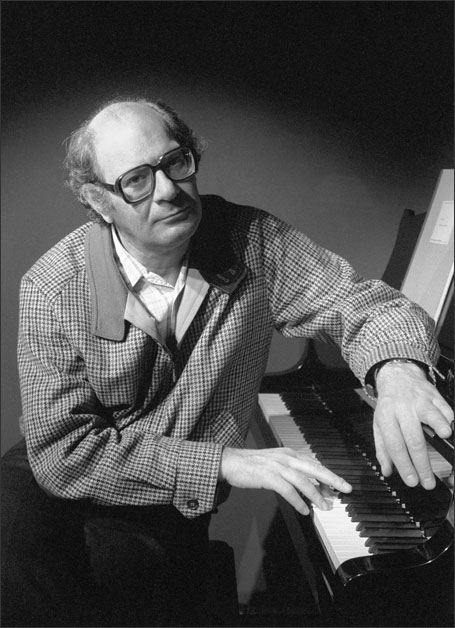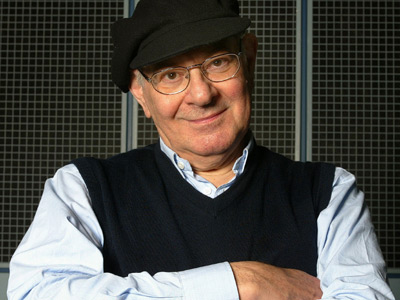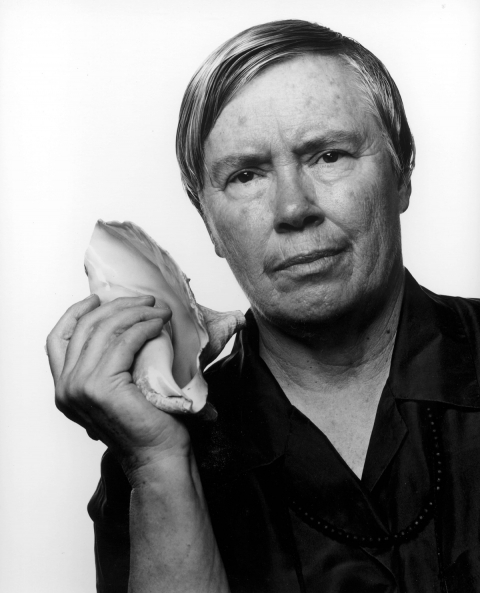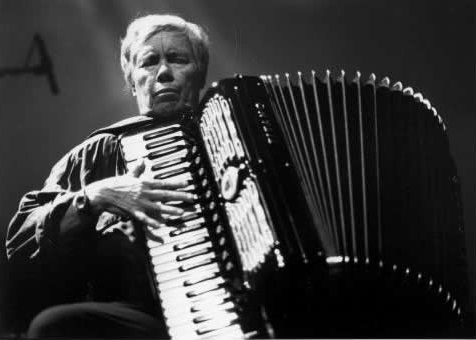<Back to Index>
- Composer Mauricio Kagel, 1931
- Composer Pauline Oliveros, 1932
PAGE SPONSOR


Mauricio Kagel (December 24, 1931 – September 18, 2008) was a German - Argentine composer. He was notable for his interest in developing the theatrical side of musical performance.
Kagel was born in Buenos Aires, Argentina, into a Jewish family which fled from Russia in the 1920s. He studied music, history of literature, and philosophy in Buenos Aires. In 1957 he came as a scholar to Cologne, Germany, where he lived until his death.
From 1960 - 66 and 1972 - 76, he taught at the International Summer School at Darmstadt.
He taught at the State University of New York at Buffalo from 1964 to 1965 as Slee Professor of music theory and at the Berlin Film and Television Academy as a visiting lecturer. He served as director of courses for new music in Gothenburg and Cologne. He was professor for new music theater at the Cologne Conservatory from 1974 to 1997.
Invited by Walter Fink, he was the second composer featured in the annual Komponistenporträt of the Rheingau Musik Festival in 1991. In 2000 he received the Ernst von Siemens Music Prize.
Among his students were Maria de Alvear, Carola Bauckholt, Branimir Krstić, David Sawer, Rickard Scheffer, Juan Maria Solare, Gerald Barry and Chao-Ming Tung.
He died in Cologne on September 18, 2008 after a long illness, at the age of 76.
Many of his later pieces give specific theatrical instructions to the performers, such as to adopt certain facial expressions while playing, to make their stage entrances in a particular way, to physically interact with other performers and so on. His work comparable to the Theater of the Absurd.
Staatstheater (1971) is probably the piece that most clearly shows his absurdist tendency. This work is described as a "ballet for non-dancers", though in many ways is more like an opera, and the devices it used as musical instruments include chamber pots and even enema equipment. As the work progresses, the piece itself, and opera and ballet in general, becomes its own subject matter. Similar is the radio play Ein Aufnahmezustand (1969) which is about the incidents surrounding the recording of a radio play.
Kagel also made films, with one of the best known being Ludwig van (1970), a critical interrogation of the uses of Beethoven's music made during the bicentenary of that composer's birth. In it, a reproduction of Beethoven's studio is seen, as part of a fictive visit of the Beethoven House in Bonn. Everything in it is papered with sheet music of Beethoven's pieces. The soundtrack of the film is a piano playing the music as it appears in each shot. Because the music has been wrapped around curves and edges, it is somewhat distorted, but Beethovenian motifs can still be heard. In other parts, the film contains parodies of radio or TV broadcasts connected with the "Beethoven Year 1770". Kagel later turned the film into a piece of sheet music itself which could be performed in a concert without the film - the score consists of close-ups of various areas of the studio, which are to be interpreted by the performing pianist.
Other pieces include Con Voce (With Voice), where a masked trio silently mimes playing instruments and Match (1964), a tennis game for cellists with a percussionist as umpire (for Siegfried Palm), also the subject of one of Kagel's films and perhaps the best known of his works of instrumental theater.
Kagel also wrote a large number of more conventional, "pure" pieces, including orchestral music, chamber music and film scores. Many of these also make references to music of the past by, amongst others, Beethoven, Brahms, Bach, and Liszt.
He has been regarded by music historians as deploying a critical intelligence interrogating the position of music in society.


Pauline Oliveros (May 30, 1932 - November 24, 2016) was an American accordionist and composer who was a central figure in the development of post war electronic art music.
She was a founding member of the San Francisco Tape Music Center in the 1960s, and served as its director. She has taught music at Mills College, the University of California, San Diego (UCSD), and Rensselaer Polytechnic Institute. Oliveros has written books, formulated new music theories and investigated new ways to focus attention on music including her concepts of "Deep Listening" and "sonic awareness".
Oliveros earned degrees from Moores School of Music at the University of Houston and San Francisco State University where her teachers included composer Robert Erickson. At the University of Houston, she was a member of the band program and was a founding member of the local chapter of Tau Beta Sigma Honorary Band Sorority.
Oliveros is one of the original members of the San Francisco Tape Music Center, which was an important resource on the U.S. west coast for electronic music during the 1960s. The Center later moved to Mills College, where she was its first director, and is now called the Center for Contemporary Music. Oliveros often improvises with the Expanded Instrument System, an electronic signal processing system she designed, in her performances and recordings.
In 1967, Oliveros left Mills to take a faculty music department position at UCSD. There, Oliveros met theoretical physicist and karate master Lester Ingber with whom she collaborated in defining the attentional process as applied to music listening. Oliveros also studied karate under Ingber, achieving black belt level. In 1973, Oliveros conducted studies at UCSD's one - year - old Center for Music Experiment; she served as the Center's director from 1976 to 1979. In 1981, to escape creative constriction, she left her tenured position as full Professor of Music at UCSD and relocated to upstate New York to become an independent composer, performer and consultant.
Oliveros coined the term "Deep Listening" in 1991, a term which she then applied to her group The Deep Listening Band and to the Deep Listening program of Deep Listening Institute, Ltd. (formerly The Pauline Oliveros Foundation, founded in 1985). The Deep Listening program includes annual listening retreats in Europe, New Mexico and in upstate New York, as well as apprenticeship and certification programs. The Deep Listening Band, which included Oliveros, David Gamper and Stuart Dempster, specialized in performing and recording in resonant or reverberant spaces such as caves, cathedrals and huge underground cisterns. They collaborated with Ellen Fullman and her long string instrument, as well as countless other musicians, dancers, and performers.
Von Gunden describes and names a new musical theory, developed by Oliveros in the "Introductions" to her Sonic Meditations and in articles, called "sonic awareness." Sonic awareness is the ability to consciously focus attention upon environmental and musical sound, requiring continual alertness and an inclination towards always listening, and comparable to John Berger's concept of visual consciousness (as in his Ways of Seeing). "Sonic awareness is a synthesis of the psychology of consciousness, the physiology of the martial arts, and the sociology of the feminist movement" and describes two ways of processing information, focal attention and global attention, which may be represented by the dot and circle, respectively, of the mandala Oliveros commonly employed in composition. Later this representation was expanded, with the mandala quartered and the quarters representing actively making sound, imagining sound, listening to present sound, and remembering past sound. This model was used in the composition of her Sonic Meditations. Practice of the theory creates "complex sound masses possessing a strong tonal center", as focal attention creates tonality and the global attention creates masses of sound, flexible timbre, attack, duration, intensity, and sometimes pitch, as well as untraditional times and spaces for performance such as requiring extended hours or environmental settings. The theory promotes easily created sounds such as vocal ones, and "says that music should be for everyone anywhere."
In 1994, Oliveros was awarded a grant from the Foundation for Contemporary Arts, the Grants to Artists award.
Oliveros later taught at Rensselaer Polytechnic Institute and Mills College. She was openly lesbian.
Oliveros was the author of several books, Sounding the Margins: Collected Writings 1992-2009, Initiation Dream, Software for People, The Roots of the Moment, and Deep Listening: A Composer's Sound Practice.
In 2007, Oliveros received the Resounding Vision Award from Nameless Sound. She was the 2009 recipient of the William Schuman Award, from Columbia University School of the Arts.